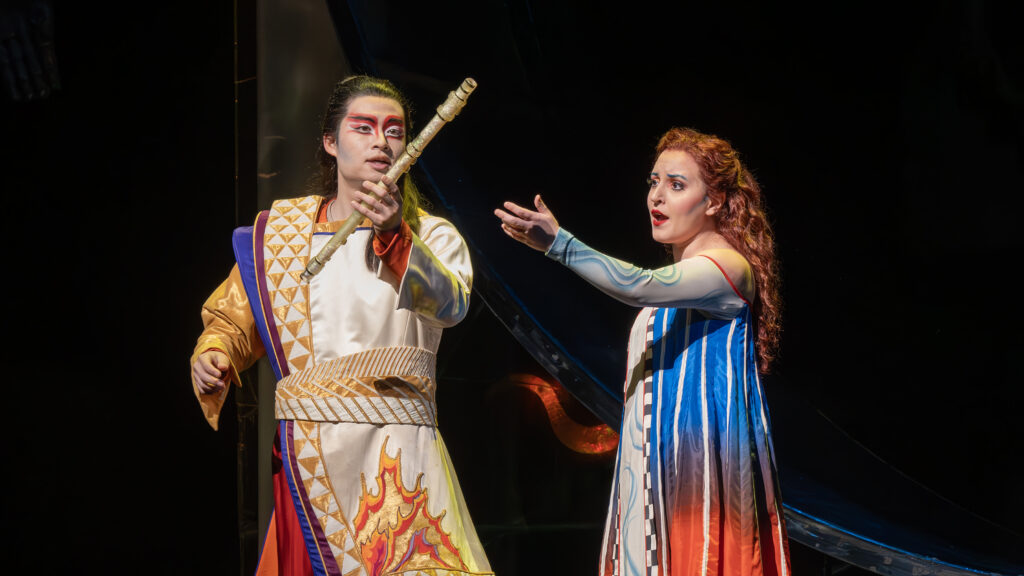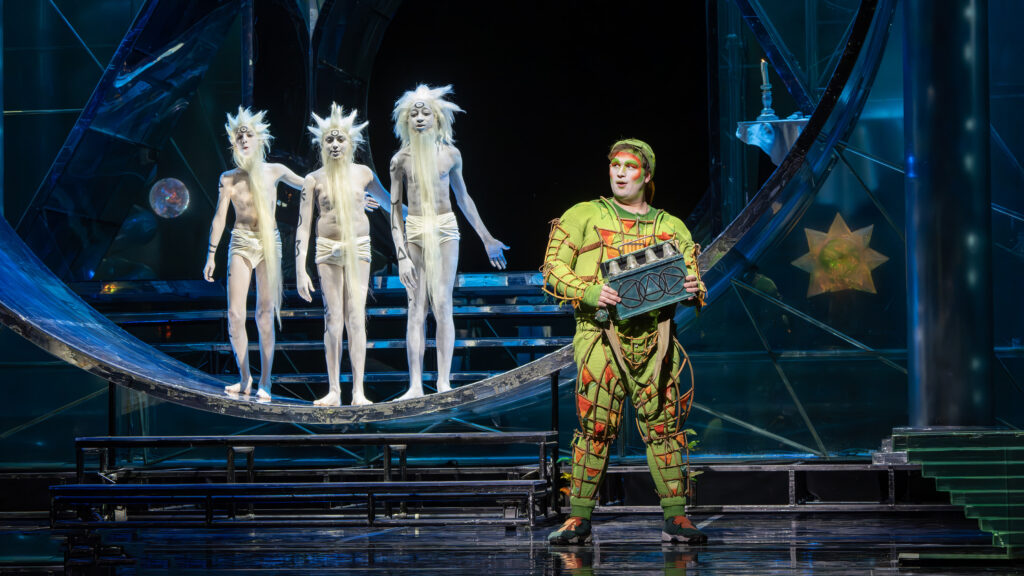“What if Jordan Peterson and Taylor Swift had a disagreement but then decided to love each other anyway?” said my opera companion upon seeing The Magic Flute for the first time Friday the 13th at the Met. In the 90-minute holiday presentation, Pamina dooms herself to a lifetime of mansplaining in Sarastro’s Temple of Wisdom, his hordes exulting as the female Dragon of Chaos is cast into darkest oblivion.
The opera’s deranged gender politics were mirrored in the show’s casting. With the delightful Emily Pogorelc holding down her part with breadth and dignity while Duke Kim, in his Met debut as Tamino, limped through each song, barely able to project to the Orchestra, let alone the Family Circle. This was a real shame given how many first-time opera goers were in the audience. It seemed a sterling example of one of the opera’s main themes: the strange vicissitudes of male mediocrity. Granted, Tamino is the Ken doll of tenor roles and there isn’t a lot of room for him to shine; however, Kim did almost nothing to bring creative richness to the role.
Kathryn Lewek was a spectacular and rewardingly histrionic Queen of Night. While bumbling slightly through the ending of “Oh, don’t tremble,” her “Hell’s vengeance boils” was as hyped and sparkly as Christmas morning. The comedic Julie Taymor costume, the Queen’s soaring cape shivering on wires attached to her bodice, worked magically. She was by far the funniest Queen of Night I’ve seen.
Peixin Chen as Sarastro rounded out the performance with his broad and bodied bass. He tooted around the stage like a benevolent anthropomorphic cloud out of a Mario Brothers game. Sean Michael Plumb as Papageno was like a round green baby wriggling and mugging and sticking out his ass, in a very Nickelodeon Junior performance. (Totally appropriate to the Mozart junior holiday presentation.)
While he had plenty more going for him than Kim, there was something a little too studied and self-satisfied in his performance, like he wasn’t asking for laughter and plaudits but had already claimed them by right. In a less adulterated production, with a more well-rounded cast, I believe he’d have been less well received. However, performing beside a lackluster Kim he was a breath of fresh air whenever he arrived on stage. Thomas Capobianco’s Monostatos was similarly amusing but too overtly clownish. There’s so much costume and gimmick and flapping around demanding big laughs, but not much in his performance took me by surprise.
The direction throughout leaned heavily into broad comedy and Taymor’s darkly whimsical puppets and costumes. Lindsay Ohse’s Papagena was charming and cheerful but otherwise unremarkable; she’s on stage so briefly that her costumes were more memorable than her singing. She mirrored but did not outshine Plumb, not that the production really gives her room to do so.
Le Bu, as the Speaker, on the other hand, took his time and took up space, giving a quiet gravitas to the role in a memorable performance. He is a lush singer and a strikingly passionate actor, making a real attempt to perform with and not merely beside the other performers. J David Jackson as conductor was adequate, although, as with some of the evening’s principal performances, I didn’t get the sense that he was trying very hard. The by-the-book conducting was prim and quick but otherwise difficult to comment on.
The abbreviated English language holiday presentation hops from aria to aria. The English is jarringly strange at first but ultimately slipped beyond notice in the finer performances. The 20-year-old Taymor production was none the worse for wear. Like Mark Morris’s The Hard Nut, Taymor’s The Magic Flute has become a seasonal classic, with the pointy breasted flamingo ballerinas as iconic as Sugar Plum fairies. I loved the ghostly, slow-moving birds and quivering silk bears.
George Tyspin’s sets are like something out of an advanced intergalactic civilization on the precipice of extinction. Taymor and Michael Curry’s costumes are so good they make me want to drop everything and enroll in Parsons for theatrical design. The designers and crafters all understood the assignment and took it seriously, so why doesn’t the Met treat the production with the respect it deserves musically? If they are indeed serious about bringing in new audiences, they could start by throwing a more well-rounded cast into their holiday presentation.
Photos: Richard Termine




